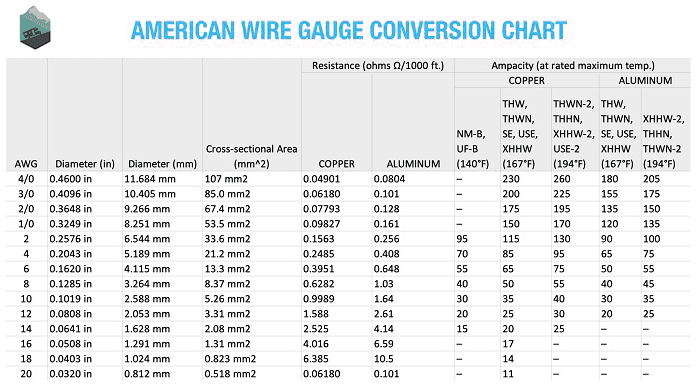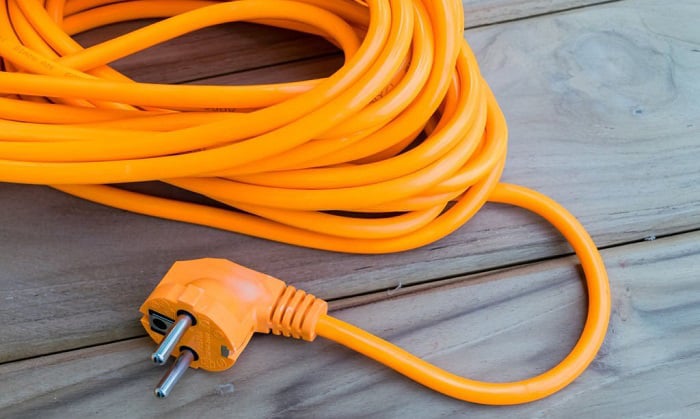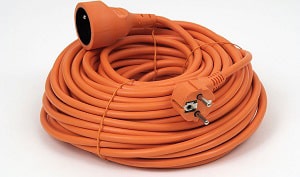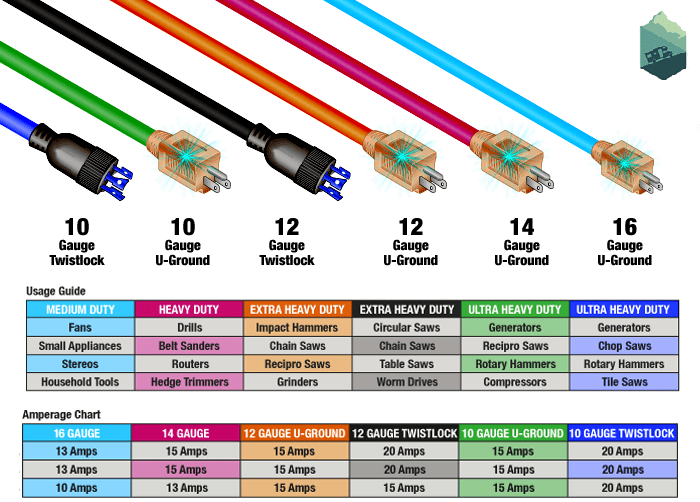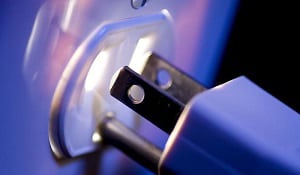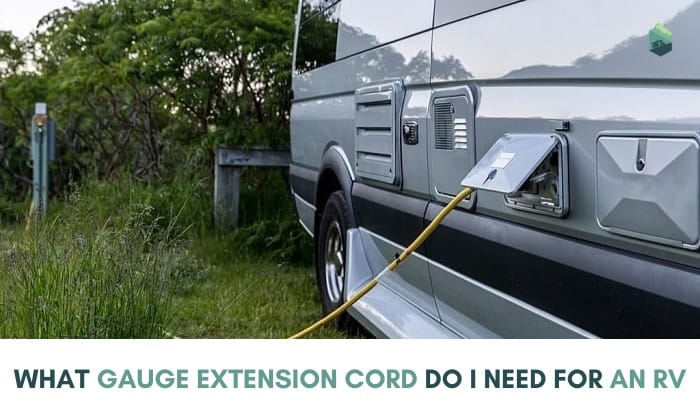
You’ll need an extension cable for your RV since it operates on a comparable voltage to that found in your home’s outlets. The issue now is “what gauge extension cord do I need for an RV?” That is dependent on the amount of amp power used by your RV.
So, here’s the hint:
- Use a 14-gauge extension cable if your RV requires 15 amps of electricity
- A 12-gauge extension cable is recommended for 20 amps
- A 10-gauge extension cord for RV is recommended for 30 amps
- The 8-gauge and 6-gauge cables are each rated at 40 amps and 50a extension cords
Below, we’ll examine gauge extension cords in more depth.
Page Contents
What Does “Gauge” Mean
The wire gauge thickness of an extension cable is one variable that determines its compatibility with your appliances and gadgets. It affects the current and heating capacity of the bulk extension cord wire. Meanwhile, the length of the extension cable affects the load and power output capability of the cord.
Extension cables are rated according to the American wire gauge (AWG) standard. By and large, the greater the AWG number, the thinner and less extensive the cable is.
What Gauge Extension Cord to Use for an RV
Not all extension cords are created equal, as it all comes down to the amperage needed, the voltage decline that can be permissible, and the temperature increase that can be taken.
1. The 15- and 20-amp circuits
They run on a power source almost identical to that used by home equipment such as stereos and televisions.
- I suggest securing a 14-gauge extension cable 0-50 feet long for camper vans that need 15 amp electricity.
- Additionally, you may run a 12-gauge wire up to 70 feet on a 15-amp circuit.
- If you want to utilize a 10-gauge wire, ensure it extends no farther than 115 feet to avoid voltage loss.
2. A 20-amp circuit
It requires a 12-gauge extension cable with a maximum length of 50 feet RV cord. Additionally, a 10-gauge wire may be used to run up to 85 feet on a 20-amp RV.
3. The Circuit of 30 Amps
It is the Most Frequently Used RV Power cable Source. Thirty amps are arguably the most popular RV size and power configuration in the RV industry. Extension cables are rated at 30 amps at 125 volts for this power.
Due to the lower voltage drop, you should have no difficulty using a 10-gauge extension cable on a 30-amp circuit. The 10-gauge wire may be run up to 150 feet. Ten-gauge extension cables are renowned for their strength and durability, making them ideal for securely powering your equipment.
Using a few cares, you can connect your 30-amp circuit with an 8-gauge wire. Ascertain that the 8-gauge wire is compatible with your circuit breaker and device connections. Apart from the #10 cable, several types of equipment designed for 30-amp connections accept 8-gauge wires at their connectors.
You don’t want to use a 14-gauge extension cable with a series of dog-bone adapters in your 30-amp setup since you’ll increase the voltage drop and danger of overheating.
4. The Big Boys: 40 and 50 Amps
Circuits that are 40 and 50 amps are considered camper power cord adapters for big boys of the camping world, supplying 240 volts to large equipment such as an electric stove. They are often seen in campsites alongside the 30 amp extension cord for the generator.
- You’ll need an 8-gauge extension cable for a 40-amp RV electrical extension cord, which is thicker than its 10-gauge equivalents.
- A 6-gauge wire is suitable with a 50-amp circuit and breaker, and perhaps even a 55-amp circuit and breaker.
Choosing the Appropriate Extension Cord Length
Apart from the Gauge wire thickness, you’ll want to consider the extension cord’s length while making your selection. The size of the extension cable affects its ability to power the RV.
In general, electricity goes further with the length of the extension cable. The extra length decreases the machine’s total amps, putting the engine and the outlet under pressure. To maximize efficiency, use the shortest extension cable possible to reach the device rapidly.
Additionally, the extension cable should not be as lengthy as the power chord. As you are probably aware, extension cables get more resistant as they lengthen, resulting in less power reaching your device. When your gadget is power-starved, it may reduce its lifetime by working at double speed to drain energy.
Electrical Safety Foundation International (ESFI) recommends a 25-50 foot extension cable for 1-13 amps (16 gauge), 14-15 amps (14 gauge), and 16-120 amps (12-10 gauge).
A 20-amp RV can run up to 100 feet on a 10-gauge extension cable, whereas a 15-amp RV can run up to 150 feet on a 10-gauge extension cord.
Storage and Safety Recommendations for Extension Cords
Extension cords provide electricity to appliances and equipment connected through cables located far from an electrical outlet. Come are some safety precautions to assist you in preventing fire risks and electrical shocks.
1. Properly Store
To wrap an extension cable correctly:
- Grasp it with one hand and stretch it to arm’s length.
- Following that, wrap the wire around the gripping hand to create big loops and minimize cord breakage.
- Secure the extension cable by surrounding it with something.
2. Ensure That Your Extension Cord Is Never Overloaded
To ensure safety, each extension cable has a maximum amperage rating or an electrical current restriction. Examine the appliance to be connected and choose an extension cable with a more excellent amp rating. If you want to merge several equipment parts, provide all the required amps to avoid an overload.
If the extension cable does not have an amp rating, you may calculate its current capacity by determining its wire gauge. The larger the Gauge, the less power the wire has.
- A ten to twelve-gauge extension cable is ideal for heavy-duty equipment such as air compressors and chainsaws.
- A 14-gauge cord is suitable for use with medium-duty tools, such as power drills.
- A 16-gauge cable is ideal for small appliances such as portable fans and holiday lights.
3. Utilize the Appropriate Prongs
Extension cables come in two or three-prong configurations. Avoid using three-prong plugs if your plug has two slots. Never remove the ground pin to forcibly lift it since this may result in an electrical shock.
A three-prong cable seems superior to a two-prong cord since it has a separate portion for the ground wire. If you must purchase a new extension cable, consider upgrading your RV to a three-prong model for increased electrical safety.
Conclusion
Now that I’ve addressed your query – what gauge extension cord do I need for an RV – you’ll know what to select the next time.
Use a 14-gauge extension cable for 15 amps, a 12-gauge extension cord for 20 amps, a 10-gauge extension cord for 30 amps, an 8-gauge extension cord for 40, and a 6-gauge extension cord for 50 foot 50 amp RV extension cord. Consider the cable length as well, since it affects the load and output capacity.
“Hi, I’m Francis’ husband—Calvin. Our story began with our shared passion for traveling. I have had a career journey for over 11 years at Ford Motor Company, where I took on the role of BMS SW Process Engineer.
Together with my wife, I have dedicated countless hours to exploring every nook and corner of the world. Ten years living in an RV may seem long, but time seems to fly by when I’m doing what I love with the person I love.
FMCA’s 103rd International Convention & RV Expo in Gillette, WY,
Like my wife, I hope to help you see the beauty of traveling off the beaten path by sharing insights into this lifestyle. In addition to my corporate roles, I also launched our website – Outdoorbits, in 2015 and continue to contribute my knowledge and skills to the present day. And I’ll be completely honest with you—no hiding the truth or sugarcoating the possible challenges.
So, if you want to run away from the busy lifestyle to embrace nature, I’m your guy.”
